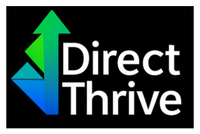From Paper to Opportunity: Turning Your CV into a Career Magnet
- Chloe Davison

- Aug 19, 2025
- 2 min read

Your CV is more than a formality it’s a gateway to new opportunities. Yet many people underestimate its power, treating it as a simple list of jobs instead of a strategic tool. A well-written CV doesn’t just inform; it persuades. It positions you as the best fit for the role before you even meet the hiring manager.
At DirectThrive, we’ve helped countless clients transform their CVs into career magnets. Here’s how you can do the same.
1. Begin with a Purpose
Every CV should have a clear objective: to connect your skills and experiences with the needs of the employer.
Ask yourself: What do I want this CV to achieve?
Focus on the roles you’re targeting and tailor your content accordingly.
2. Lead with Impact
The top third of your CV is prime real estate. Use it to hook the reader instantly.
Include a strong personal profile with 2–3 key achievements or skills.
Avoid generic phrases like “hard-working” or “enthusiastic” unless you can back them up with evidence.
Example:“Innovative project coordinator with a track record of delivering multi-million-pound initiatives on time and within budget.”
3. Prioritise Achievements Over Duties
Employers want results, not job descriptions. Instead of saying what you were responsible for, show what you delivered.
Use quantifiable metrics where possible: percentages, monetary figures, deadlines met.
Keep each achievement concise but impactful.
4. Tailor for Every Application
A single, generic CV sent to multiple employers is rarely effective.
Analyse the job advert and mirror its key skills and keywords.
Emphasise the most relevant experiences for that role.
5. Make It Easy to Read
Recruiters often skim through dozens of CVs in minutes.
Keep the layout clean, with clear headings and bullet points.
Use a simple, professional font like Arial or Calibri.
Avoid long paragraphs — make your skills and successes easy to spot.
6. Add Skills and Extras Strategically
Include a skills section to highlight both hard skills (e.g., software, technical expertise) and soft skills (e.g., leadership, collaboration).
List relevant training, certificates, and professional memberships.
Include languages or voluntary work if they strengthen your application.
7. Update and Refine Regularly
A great CV is never ‘finished’.
Review it quarterly to add new achievements.
Remove outdated or irrelevant details.
Keep it ready so you can apply quickly when opportunities arise.
Final Word
Your CV is a personal investment. The time you put into crafting it can directly influence the doors that open for you. At DirectThrive, we help you not only create a compelling CV but also position yourself as the standout candidate in any application pool.
If you want your CV to work harder for you, get in touch today — let’s turn paper into opportunity.




Comments